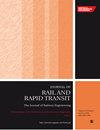A numerical study on locomotive wheel wear on curved track subjected to adhesion control
IF 2.1
4区 工程技术
Q3 ENGINEERING, CIVIL
Proceedings of the Institution of Mechanical Engineers Part F-Journal of Rail and Rapid Transit
Pub Date : 2024-09-03
DOI:10.1177/09544097241280094
引用次数: 0
Abstract
The wheel wear of heavy-duty locomotives is more complicated than that of other vehicles when it affects tractive force and adhesion control. The purpose of this article is to calculate wheel wear on a curved track using a co-simulation dynamic model of a heavy-duty locomotive with adhesion control. Additionally, the effect of creep threshold, decline slope, curve radius, and passing speed on wheel wear is further investigated. The findings demonstrate that wheel wear can be successfully decreased by adjusting the creep threshold and decline slope of adhesion control parameters. The wheel-rail stick-slip vibration behavior on the curve track can be eliminated by increasing the curve’s radius and passing speed, but the vertical wear at the left wheel’s flange will rise sharply with the increase of passing speed on right hand curve.受附着力控制的弯曲轨道上机车车轮磨损的数值研究
重型机车的车轮磨损会影响牵引力和附着力控制,因此比其他车辆的车轮磨损更为复杂。本文的目的是使用具有附着力控制功能的重型机车的协同仿真动态模型,计算弯曲轨道上的车轮磨损。此外,还进一步研究了蠕变阈值、下降坡度、曲线半径和通过速度对车轮磨损的影响。研究结果表明,通过调整附着力控制参数的蠕变阈值和下降斜率,可以成功减少车轮磨损。通过增加曲线半径和通过速度,可以消除曲线轨道上的轮轨粘滑振动行为,但左轮轮缘处的垂直磨损会随着右侧曲线通过速度的增加而急剧增加。
本文章由计算机程序翻译,如有差异,请以英文原文为准。
求助全文
约1分钟内获得全文
求助全文
来源期刊

CiteScore
4.80
自引率
10.00%
发文量
91
审稿时长
7 months
期刊介绍:
The Journal of Rail and Rapid Transit is devoted to engineering in its widest interpretation applicable to rail and rapid transit. The Journal aims to promote sharing of technical knowledge, ideas and experience between engineers and researchers working in the railway field.
 求助内容:
求助内容: 应助结果提醒方式:
应助结果提醒方式:


